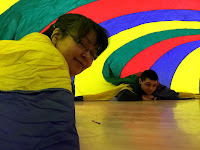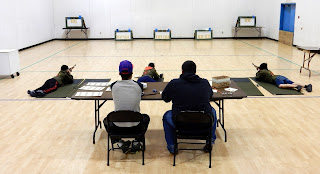 |
| PD Cake. Made by JF. |
February 15 - 19 was Professional Improvement (PI)
Week for all teachers in Nunavut. We are
students for the duration of the week, learning new skills & acquiring
knowledge that will benefit us and our younger students. Regular classes are not held during this
week. The majority of teachers in the
Qikiqtani Region - (where I teach) - would be completing their PI in their home
communities. (We had our regional
conference in Iqaluit last year - Part 1, Part 2, Part 3). Of
course, several teachers would be completing their PI outside their communities
and even down south. I would be staying
in Arctic Bay.
 |
| Greg & Greg. |
For the first two days, I participated in a SMART Board
Training workshop, led by Greg, the Grade 6 teacher. (Teachers are allowed to organize workshops
as part of their PI, as long as it falls under certain criteria). I have worked with SMART Boards in the past,
but that was several years ago, so a review/upgrade of my abilities was
necessary. Many teachers at Inuujaq School
were taking the workshop because the school is in the process of acquiring more
SMART Boards.
Greg began his workshop by welcoming everyone to his
classroom and briefly explaining that a SMART Board is an interactive white
board that encourages experiential learning and collaboration. He added that the board has been a "big
hit" with his students and that it would also be well received by students
from all classes.
 |
| John's digital B-Day card. |
 |
| John cuts the PD cake. |
Our first lesson was to learn/review how to write &
erase on the board using the specially designed pens & eraser. We concluded the quick lesson by signing a
digital birthday card that Greg had prepared for John, the Grade 8
teacher. As the day progressed, we
learned many things, such as, how to draw, insert/import pictures, save,
duplicate objects, and create lessons. We also learned how to properly transport the mobile SMART Board between classrooms. Greg made sure to give the teachers plenty of time to work with the board.
 |
| SMART Board training. |
During the second day of the workshop, we learned more
about the SMART Board software and SMART Exchange, a website where one can find
a vast amount of content made by the company, teachers, business people, and
enthusiasts. We concluded the workshop
by brainstorming ideas for lesson plans and some teachers began working on
lesson plans that incorporate the interactive white board. Overall, we learned a lot from the two-day
workshop. Thanks Greg!
 |
| Me & JF try to move a balloon between our heads without using our hands. |
Several teachers & I got quite a workout on the third
day of PI Week. We signed up for
Cooperative Games, a workshop organized by Jean-Francois (JF), the high school
math & science teacher. The workshop
would give participants a list of team building games to use for their PE
classes. (I don't teach PE but I wanted
to try something new and see if I could use the games for cadets). The workshop is geared towards K-9 classes
but I thought maybe the high school students would enjoy playing the games. The core feature of the games is that no one
gets eliminated; everyone participates from beginning to end. This would be quite an adjustment for me
because I grew up playing games with elimination (ie. dodge ball, capture the
flag, paintball, video games). I think
the other teachers shared similar views.
 |
| JF on a gym scooter and me moving him around. |
We had the whole gym to ourselves for the day. We emptied out the equipment room to see what
we had at our disposal. There was a lot
of resources we could use. We learned and
played a variety of games, some of which were quite funny. Some of the games we played were: using our
heads to move a balloon around, passing balloons through hula-hoops, and moving
people using gym scooters. We also
learned a plethora of parachute games because they are always a hit with the
younger grades.
 |
| Parachute Feet. Picture taken by JF. |
 |
| Abbie (kindergarten) and I inside the parachute. Picture taken by JF. |
To finish off the workshop, JF instructed us to come up
with our own cooperative game using the materials in the equipment room. (He reminded us that no one was to be
eliminated). We were able to come up
with a "game" after much thought and trial-and-error. The "game" involved passing a
volleyball around and running to touch the nearest walls. There's more tweaking to be done. In the end, we all had fun and learned some
pretty cool cooperative games. Thanks
JF!
During the last two days of PI Week, I devoted my time to
professional reading. I had received
funding to purchase books on the following topics: differentiated learning, preventing/solving
disciplinary problems, and creating a trauma-sensitive classroom. I also purchased course materials from ASCD
on how to teach children with learning disabilities. The latter resource requires more than two
days to review. My plan is to become
proficient in the course over the following months and teach it to the staff in
the fall.
I particularly liked the books on preventing/solving
disciplinary problems and creating a trauma-sensitive classroom. Both books are easy to read and give many
ideas & suggestions that teachers and administrative staff can use. I'm still working my way through the
differentiated learning book.
Other activities that teachers completed during PI Week
were: sewing, classroom management, Inuktitut typing, translating resources,
and learning Inuktitut. Overall, PI Week
was mostly a success. There was only one
serious incident that unexpectedly occurred.
(More on that in a future post).
 |
| Stage II Postal Shoot. |
On Sunday, February 21, 3045 Army Cadet Corps held an
afternoon Stage II Postal Shoot to determine if we were eligible to send our
marksmanship team down to Gimli, Manitoba, for a Stage III shooting
competition. Each team member had to
shoot three sets of targets: two prone & one standing. The adult staff would score the targets and
then mail them to Winnipeg for verification.
If the overall score is the highest, or one of the highest, from the
total number of corps participating in the Postal Shoot, then our team would be
allowed to attend the competition down south.
There are four shooting competition stages in the cadet
program. Stage I is for local corps
only. Stage II is a postal shoot that
determines who can go to Stage III.
Stage III is a provincial/territorial/regional shooting competition, and
Stage IV is a national competition. Only
the best from Stage III compete at the national level.
There was a lot of excitement and anticipation from the marksmanship
team that afternoon while they set up the firing range in the school gym. The cadets would be shooting targets at 10 metres
with the Daisy Air Rifle. For standing
relays, the cadets had fifteen minutes to shoot ten rounds. For prone relays, the cadets had thirty
minutes to fire twenty rounds. The only
sounds you could hear during the relays were lead pellets hitting the targets
and the cadets pumping the air rifles.
I think our marksmanship team has a really good chance of
being selected for the Stage III competition in April. We'll find out which corps have been selected
next month.






No comments:
Post a Comment